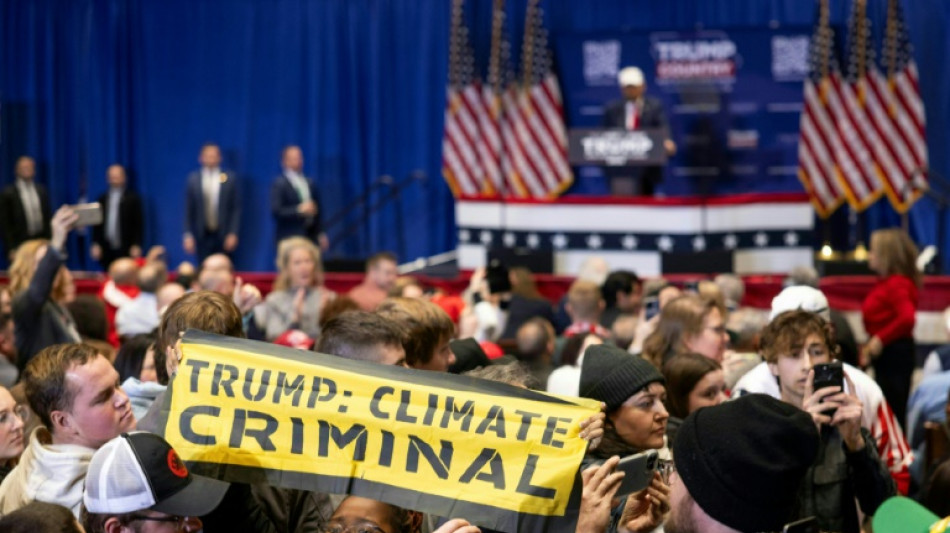

Trump vs Harris: Competing visions for a warming world
"Drill, baby, drill" versus championing green energy: Donald Trump and Kamala Harris offer starkly opposing visions on climate, with the outcome of the US presidential race poised to shape the planet's warming trajectory.
Neither candidate has outlined a comprehensive platform on climate, an issue that remains far from the center of the US campaign, despite the country being the world's second-largest emitter of greenhouse gases, after China.
But their positions are no mystery.
Former president Trump has long denounced climate change as a "hoax" and pledged to reverse the climate-friendly policies of the Biden-Harris administration if elected.
A Trump victory could significantly slow the pace of the green transition, dashing hopes of meeting critical long-term warming targets. A US retreat from climate diplomacy would undermine global efforts to reduce reliance on fossil fuels.
Even before the January inauguration, his election would immediately weaken the influence of US negotiators at the COP29 UN climate summit, set to begin just six days after the vote.
Greater commitments from wealthy nations like the United States are seen as essential to boosting financial support for vulnerable developing countries, a key focus of this year's talks.
During his presidency, Republican Trump withdrew from the landmark Paris Agreement and has vowed to do so again if reelected, after President Joe Biden restored US participation.
To meet its Paris obligations, the United States committed to the ambitious goal of cutting its greenhouse gas emissions in half by 2030, compared to 2005 levels. By 2023, it had achieved an 18 percent reduction, according to the Rhodium Group.
"We have to really stay the course, and that would be a complete reversal under Trump," according to Leah Stokes, a political scientist at UC Santa Barbara, who specializes in climate.
"The outcome of the American election will have ramifications for the whole planet," she told AFP.
- 'Green New Scam' -
Harris, who attended COP28 where the United States played a key role in striking a deal to phase out fossil fuels, "is committed to continuing and building upon the United States' international climate leadership," according to her campaign website.
As a senator, she co-sponsored a "Green New Deal" resolution calling for a drastic reduction in greenhouse gas emissions -- dubbed the "Green New Scam" by Trump.
In 2019, as a Democratic primary candidate, she called for a ban on fracking -- a controversial and highly polluting process that has made the US a top producer of natural gas and crude oil but comes with steep costs to the climate as well as local water and air quality.
She has since changed her tune due to the political realities in Pennsylvania, a key swing state where the fracking industry plays an important economic role.
As she campaigns across the country, she has made little mention of climate change.
In her only televised debate with Trump, she defended the need for "diverse sources of energy," even boasting that under the Biden-Harris administration, "we have had the largest increase in domestic oil production in history."
This position has drawn quiet criticism from some supporters.
Still, she continues to enjoy broad backing from environmental groups, who are encouraged by her overall track record -- from taking on oil companies as California's attorney general to casting the tie-breaking vote on the "Inflation Reduction Act," which has driven unprecedented investment in green energy.
The IRA is frequently attacked by Trump, who has vowed to "rescind all unspent funds," but reversing a law is complex. Even some elected Republicans oppose the move, pointing to the benefits of the tax credits it provides.
- Deja vu -
Trump has also promised to cancel Joe Biden's moratorium on new liquefied natural gas (LNG) export permits and end what he calls the "electric vehicle mandate" -- a reference to new car emissions standards aimed at accelerating the shift to electric vehicles, that are not, in fact, a mandate.
Other newly enacted Environmental Protection Agency rules, for example those aimed at drastically curbing carbon emissions from fossil fuel-fired power plants, also face the chopping block.
"I do expect to see a fair amount of litigation over any efforts to repeal these regulations," Fatima Ahmed, of the climate consulting firm Boundary Stone, told AFP.
She's also heartened that state and local governments, along with the private sector, will continue advancing climate initiatives, as was seen during Trump's first term.
But even with local and private efforts pushing forward, the potential national impact remains staggering.
According to an analysis by Carbon Brief, which specializes in climate science and policy, a Trump victory could lead to an extra four billion tonnes of CO2 equivalent emissions by 2030 compared to a Democratic president -- roughly the combined annual emissions of the European Union and Japan.
V.Reding--LiLuX



